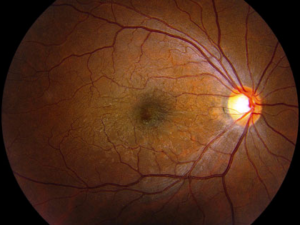- On this page: Symptoms
- Causes and Associations
- Testing
- Treatment
A macular pucker is caused by an abnormal, cellophane-like piece of tissue that grows as a sheet on the surface of the macula. This tissue causes the retina and macula to wrinkle or bulge.
The macula is a small area in the center of the retina that is responsible for straight-ahead or focused vision. The center of the macula is the thinnest part of the retina and is susceptible to complications, particularly as one ages.
This condition is also referred to as epiretinal membrane, cellophane maculopathy, or surface wrinkling retinopathy.

Symptoms of a wrinkled retina may include:
Macular pucker does not usually affect peripheral vision.
Age is the most common cause, and is more common in those 55 years and older.
Other potential associations include patients who have:
A comprehensive eye examination is important to assess the condition, including vision testing, eye drops to dilate the pupils, and a complete examination of the front and back of the eye. A driver should accompany the patient during their eye exam as pupillary dilation may create near-vision blurring.
People with a macular pucker may undergo other diagnostic tests to evaluate their condition, including:
Vitrectomy surgery with membrane peeling is the usual macular pucker treatment. This is an outpatient procedure usually performed under local anesthesia to remove the vitreous gel and peel away the abnormal membrane on the surface of the retina that is causing the wrinkle or pucker.
After macular pucker surgery, most people attain some degree of noticeable visual improvement, but the improvement is usually gradual (weeks to months). It is relatively common to have cataract development or progression months after the operation. Your surgeon will explain the risks and benefits of wrinkled retina surgery, discuss alternative treatment options, and make tailored recommendations based on your specific case.
If you have any signs or symptoms of macular pucker, contact us today to meet with a Mid Atlantic Retina specialist. Our team will work with you to protect your vision and minimize your complications.
If you have any signs or symptoms of macular pucker, contact us today to meet with a Mid Atlantic Retina specialist. Our team can work with you to protect your vision and minimize your complications.